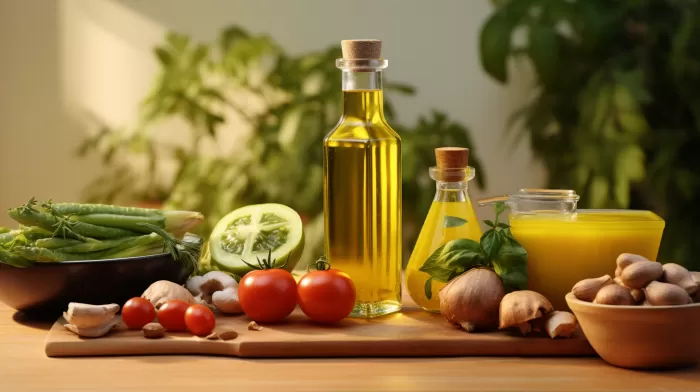The battle against unhealthy fats continues, and the United States Department of Agriculture (USDA) is pushing the right oils to consume for a healthy heart. With recent updates to the Dietary Guidelines for Americans, the USDA now recommends using oils containing mono- and polyunsaturated fats, such as olive and canola oils, in place of butter and oils high in saturated fat. This is great news for those seeking healthier options in their diets.
Why You Should Choose Heart-Healthy Oils Over Butter
Butter is undeniably appealing for its rich, savory flavor, but awareness of its artery-clogging fats has made room for healthier alternatives to rise in popularity. In just one tablespoon of olive oil, only 2 grams of artery-clogging fat is present compared to 7 grams found in the same amount of butter.
The use of heart-healthy oils in cooking can greatly benefit cholesterol levels and overall cardiovascular health, so it’s time to reconsider which kind of fat you and your loved ones are consuming.
A Closer Look at Mono- and Polyunsaturated Fats
Replacing harmful fats with healthier fats is possible through the incorporation of mono- and polyunsaturated fats. These fats contribute to a balanced diet and help your body absorb essential vitamins. The two types of healthy fats are:
- Monounsaturated fats: Found in a variety of oils and nuts, such as olive oil and almonds, these fats can help lower bad cholesterol levels and reduce the risk of heart disease.
- Polyunsaturated fats: Found in fatty fish, soybean oil, sunflower oil, and some seeds, polyunsaturated fats can help lower bad cholesterol levels and provide essential fatty acids such as omega-3s and omega-6s that the body cannot produce on its own.
Eating Less of Everything and Opting for the Mediterranean Diet
Another key to winning the fight against obesity is simply eating less. Americans are encouraged to cut down on overall food intake, specifically sugary, salty, and fatty foods. Instead, the USDA recommends a dietary approach similar to that of the Mediterranean diet, focusing on high intake of fruits, vegetables, whole grains, and seafood.
The obesity epidemic currently affecting the United States has more than just health risks. The Centers for Disease Control and Prevention reports that an astounding 30% of Americans are obese. Monetary repercussions from medical problems related to excess weight reached an estimated total of $92 billion in 2002, the last year such figures were reported. This money could have been channeled into more productive pursuits had healthier dietary choices been made.
Heart-Healthy Oil Recommendations and Cooking Tips
In order to make a significant dietary change and improve cardiovascular health, below are some recommendations and cooking tips to get you started on the right path:
- Olive oil: Known for its abundant health benefits, this heart-healthy oil has been a staple of the Mediterranean diet. Opt for extra-virgin olive oil, which is less processed and retains more nutrients. It is best suited for low-heat cooking, salad dressings, and dipping.
-
Canola oil: This versatile oil is low in saturated fats and a good source of omega-3 fatty acids. Canola oil can be used for higher-heat cooking, baking, and grilling.
-
Avocado oil: A great source of monounsaturated fats, avocado oil is high in lutein, an antioxidant beneficial for eye health. It has a high smoke point, making it suitable for high-heat cooking, and can also be used in dressings.
-
Flaxseed oil: Packed with omega-3 fatty acids, flaxseed oil should not be exposed to heat. Instead, use it for salad dressings or drizzle it over pasta, rice, or vegetables.
Adjusting to a healthier diet is all about making small changes and staying committed. Though the switch from butter and saturated fats to heart-healthy oils may seem like a small step, it has lasting impacts on your overall well-being.
Now that you know the importance of choosing the right oils for a healthier heart and how to integrate them into your daily cooking routine, you can confidently wave goodbye to artery-clogging ingredients and welcome a whole new world of better health and improved vitality.



